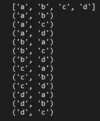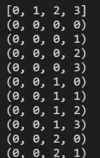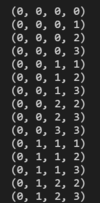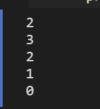itertools Flashcards
(27 cards)
count()
an infinite interator
counter = itertools.count()
for num in counter:
if num > 10:
break
print(num)
To use the itertools methods what is required?
import itertools
What does this return, if the preceding counter was 12?
print(next(counter)
13 or the next value in the counter.
What does this return?
data = [100, 200, 300, 400]
daily_data = list(zip(itertools.count(), data))
daily_data
[(0, 100), (1, 200), (2, 300), (3, 400)]
What does this return?
data = [100, 200, 300, 400]
daily_data = list(enumerate(data))
daily_data
the same result as itertools.count()
[(0, 100), (1, 200), (2, 300), (3, 400)]
Provide the values returned If given
counter = itertools.count(start=5, step=5)
print(next(counter))
print(next(counter))
print(next(counter))
print(next(counter))
5
10
15
20
Why won’t this zip method return 10 values?
data = [100, 200, 300, 400]
daily_data = list(zip(range(10), data))
daily_data
[(0, 100), (1, 200), (2, 300), (3, 400)]
Because the zip() is exhausted by the data, only four values being inputed.
What would be the outcome of this if itertool.zip_longest() was utilized instead of zip()?
data = [100, 200, 300, 400]
daily_data = list(zip(range(10), data))
daily_data
[(0, 100), (1, 200), (2, 300), (3, 400)]
Full range would be outputed with None values for those that do not have a subsequent match
[(0, 100), (1, 200), (2, 300), (3, 400), (4, None), (5, None), (6, None), (7, None), (8, None), (9, None)]
cycle()
An Infinite iterator
counter = itertools.cycle([1,2,3])
print(next(counter)) #1
print(next(counter)) #2
print(next(counter)) #3
print(next(counter)) #1
print(next(counter)) #2
What is this cycle() mimicing?
counter = itertools.cycle((‘On’, ‘Off’))
an on off toggle switch, value is either on or off.
repeat()
Infinite iterator
counter = itertools.repeat(2, times= 3)
print(next(counter)) #2
print(next(counter)) #2
print(next(counter)) #2
print(next(counter)) Traceback (most recent call last) StopIteration
What is the output?
squares = map(pow, range(10), itertools.repeat(2))
print(list(squares))
0-9 squares
[0, 1, 4, 9, 16, 25, 36, 49, 64, 81]
What is the ouput?
squares = itertools.starmap(pow, [(2,5), (3,2), (10,3)])
2 to the 5th = 32
3 squared = 9
10 cubed = 1000
combinations()
Combinatoric iterator
order does not matter
letters = [‘a’, ‘b’, ‘c’, ‘d’]
result = itertools.combinations(letters, 2)
for item in result:
print(item)

permutations()
Combinatoric iterator
good for racing events where order matters
letters = [‘a’, ‘b’, ‘c’, ‘d’]
for item in itertools.permutations(letters, 2):
print(item)

product()
Combinatoric iterator
equivalent to a nested for-loop, similiar to combination_with_replacement. good for password cracking type app
for item in itertools.product(numbers, repeat=4):
print(item)

What does this return?
numbers = [0, 1, 2, 3]
for item in itertools.combinations_with_replacement(numbers, 4):
print(item)
(0, 0, 0, 0) (0, 0, 0, 1) (0, 0, 0, 2) (0, 0, 0, 3) (0, 0, 1, 1) (0, 0, 1, 2) (0, 0, 1, 3) (0, 0, 2, 2) (0, 0, 2, 3) (0, 0, 3, 3) (0, 1, 1, 1) (0, 1, 1, 2) (0, 1, 1, 3) (0, 1, 2, 2)

chain()
Iterator terminating on the shortest input sequence
combines lists and then iterates over them in order
for items in itertools.chain(letters, numbers, names):
print(items)
islice()
Iterator terminating on the shortest input sequence
elements from seq[start:stop:step]
range of 10 cut by half
for item in itertools.islice(range(10), 5):
print(item)
0
1
2
3
4
compress()
Iterator terminating on the shortest input sequence
data, selectors
selectors = [True, True, False, True] letters = ['a', 'b', 'c', 'd']
for item in itertools.compress(letters, selectors):
print(item)
a
b
c
filterfalse()
Iterator terminating on the shortest input sequence

this values are NOT less than 2 # returns values that are false in the list # that was passed (numbers)
for item in itertools.filterfalse(lt_2, numbers):
print(item)
dropwhile()
Iterator terminating on the shortest input sequence

any values less than 2 will be dropped # once a True conditon is met it will return # rest of the values in the list True or not.
numbers = [0,1,2,3,2,1,0]
for item in itertools.dropwhile(lt_2, numbers):
print(item)
takewhile()
Iterator terminating on the shortest input sequence
similiar to dropwhile() # first two values are True # breaks from the iterable once a False value is met
for item in itertools.takewhile(lt_2, numbers):
print(item)
accumulate()
Iterator terminating on the shortest input sequence

running total of the values in the list
print(numbers)
for item in itertools.accumulate(numbers):
print(item)





